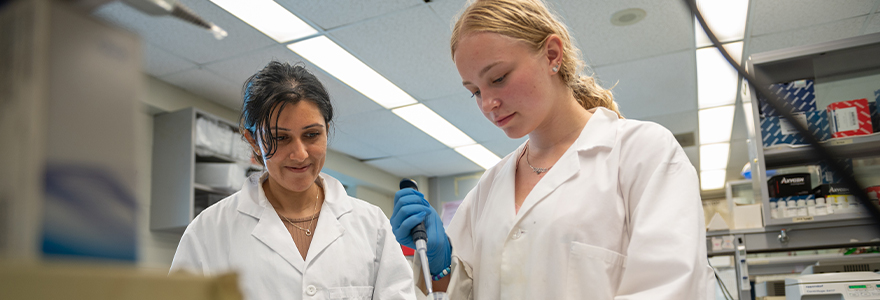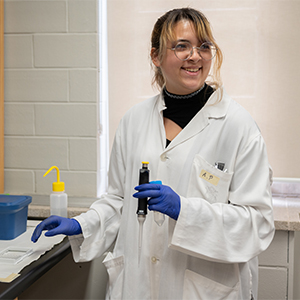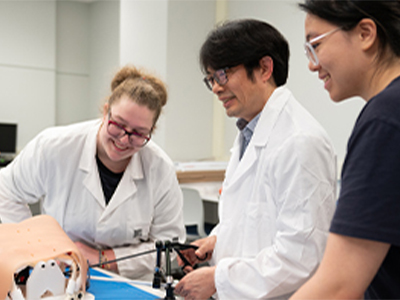Pioneering program opens doors to new opportunities for high-school students from diverse backgrounds

Nuwanthika Wathuliyadde, PhD Candidate (left) mentors Mila Campbell one of the grade 10 students attending the X-LABS program. (Photo: Mac Lai/Schulich Communications)
By Annamaria Leahey
From a young age, Mila Campbell has always envisioned herself as a nurse. Similarly driven by an unwavering desire to aid those in need, Emily Wood knew her calling in life was to become an emergency medical technician. Ariana Peñaranda's insatiable curiosity about how things work is what ignited her passion to pursue a career in science.
Through a new Schulich School of Medicine & Dentistry program designed to make biomedical sciences more accessible for students from diverse backgrounds, the trio are among the first group of local high-school students experiencing first-hand what their future in science could look like.
The immersive, two-week program called The Experiential Learning Academy for Biomedical Sciences (X-LABS), exposes 10 promising students from area high schools to every aspect of a potential career in biomedical sciences – from participating in scientific environments, lab work and research to observing state-of-the-art demonstrations and establishing relationships with world-renowned faculty and student leaders.
“There's nothing more thrilling than being in such an exciting scientific environment,” said Campbell, who has been exploring the effects of prenatal alcohol exposure during her first week in the program. “You can read and study medical research all you want, but actually getting to work hands-on with so many fascinating and intelligent people has been absolutely eye-opening.”
 Ariana Peñaranda, student participant of X-LABS. (Photo: Mac Lai/Schulich Communications)
Ariana Peñaranda, student participant of X-LABS. (Photo: Mac Lai/Schulich Communications)
Getting in the game
The program seeks to empower students who show promise in STEM by providing them with foundational scientific experiences to inspire their educational and career paths, said Jefferson Frisbee, PhD, a professor and Chair of Medical Biophysics at the Schulich Medicine & Dentistry, and creator of the program.
“These talented students deserve to be here, enhancing their understanding of biomedical science research. This program is giving them a chance to get in the game,” said Frisbee.
Inspired by his participation in such causes as Habitat for Humanity and 519 Pursuit, Frisbee modeled the program after a highly successful “Health Sciences and Technology Academy” at the West Virginia University Health Sciences Center – a program Frisbee discovered during his tenure in the University’s Department of Physiology and Pharmacology.
The students will live in Western University dormitories for the full two weeks and participate in activities at Schulich Medicine and across campus. The teens’ families are also being included in the programming in recognition of the integral roles they can play in helping their kids navigate higher education on route to pursuing their dreams.
“We’re trying to set these students up for success in pursuing a higher education and unveiling future opportunities they never thought possible,” said Frisbee.
X-LABS is a partnership between Schulich Medicine researchers and secondary schools in the Thames Valley (TVDSB) and Avon Maitland (AMDSB) District School Boards. The program hopes to enhance science education in secondary schools, empower communities through youth leadership, and – ultimately – increase the diversity of students pursuing post-secondary education and careers in STEM and biomedical sciences.
“This experience has opened many doors for me and the other students. We've been exposed to a wide range of subjects and gained valuable insights into the realities of working in the medical field. It's an opportunity that more professions should provide, allowing individuals to explore different paths,” said Wood, who has been learning the ins and outs of heart surgery and medical imaging.
 Emily Wood (left) watches demonstration from Assistant Professor Elvis Chen and second year Medical Sciences student Emma Zhang. (Photo: Mac Lai/Schulich Communications)
Emily Wood (left) watches demonstration from Assistant Professor Elvis Chen and second year Medical Sciences student Emma Zhang. (Photo: Mac Lai/Schulich Communications)
Each participant is assigned to a faculty member who is mentoring them through the immersive scientific experience.
Van Lu, an assistant professor in Physiology and Pharmacology at Schulich Medicine, introduced Peñaranda to the science of gut cell activity and, together, they are investigating the effects of dietary nutrients by using advanced molecular techniques.
“We are very excited about this new outreach program,” said Lu. “This is a great way to help out surrounding school districts as well as expose younger students to what it is that we do here on a daily basis. They get to ask the important questions that will hopefully inspire them to pursue a path in science.”
Changing the future of health care
Keith Graham is very passionate about the possibilities for the future of health care when he talks about the X-LABS program. While the retired investment industry executive from Chatham-Kent is helping support the program financially, he said this initiative is “not about the money.”
“I'm a firm believer that if you provide the right opportunity for someone to try something, all of a sudden it opens minds,” said Graham. “They might think, ‘I can’t do that, or it’s beyond me.’ But then these young people get introduced to the possibilities and their worlds open up.”
Graham, who also supports Schulich Medicine’s Discovery Week program, which sends all first-year medical students into rural communities in southwestern Ontario, sees the X-LABS program as another way to help solve the physician shortages faced in many regions in the province.
“By providing opportunities for these students to see health care as an opportunity, then it’s more likely they’ll return to their communities and provide the services that are very much needed there.”
Graham hopes this first camp experience will encourage participants to tell their friends about their experiences, and the camp will grow in popularity that way.
“We have a crisis in our country and we need more and better trained health-care workers who are drawn from a wider socio-economic circle,” said Graham, who added that removing these barriers is one way to do it.
“With the right mindset and work ethic and little bit of luck and opportunity, amazing things can happen.”
If you would like to lend your support to opportunities like this that aim to make STEM careers more accessible to a diverse range of individuals, contact Kristen Lesko at kristen.lesko@schulich.uwo.ca








